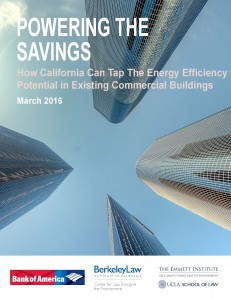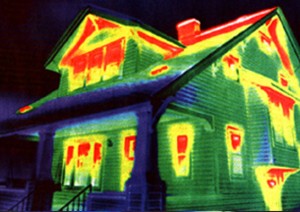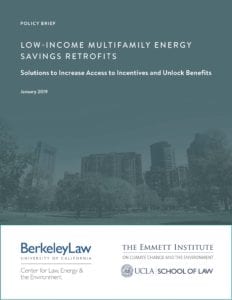California will need to double the energy efficiency of existing buildings by 2030 in order to achieve the goal of reducing greenhouse gas emissions 40 percent below 1990 levels by that year. While state leaders have adopted aggressive standards for efficiency in appliances and new construction, convincing property owners to undertake retrofits to improve energy performance, from switching out incandescent light bulbs to LEDs to installing energy efficient windows and wall insulation, is a tough task. It’s made even more challenging for low-income residents of multifamily buildings who may not own their units or building common spaces or otherwise lack the fiscal incentives and means to pay for this work.
To address the challenge, the Center for Law, Energy & the Environment (CLEE) at Berkeley Law and UCLA School of Law’s Emmett Institute on Climate Change and the Environment will soon launch a new report, Low Income, High Efficiency (we released a policy brief with some of the top-level findings earlier this year). On Thursday, June 20 at 10am, the law schools will host a free webinar to discuss the report’s recommendations for improving low-income multifamily energy efficiency incentives, with experts including:
- California Energy Commissioner Andrew McAllister
- Peter Armstrong of Wakeland Housing
- Martha Campbell of the Rocky Mountain Institute
The new report, co-authored by CLEE and the Emmett Institute and sponsored by Bank of America, is based on two stakeholder convenings organized to identify solutions to the cost and complexity of efficiency retrofits in the low-income multifamily sector. These buildings face limited access to capital, complex financing arrangements and restrictions, and competing renovation needs. California’s energy regulators and electric utilities operate a number of incentive and rebate programs, but strict income qualification criteria, program complexity, and a lack of adequate energy data can limit uptake.
As described in our policy brief this year, the report will offer a range of solutions to increase access to energy efficiency incentives and unlock environmental, financial, and quality-of-life benefits for owners and residents alike, including:
- Creating a single, statewide “one-stop shop” efficiency program administrator to comprehensively manage incentives and offer users a single point of access.
- Expanding innovative financing mechanisms such as “pay as you save” and third-party “energy budget” arrangements that take advantage of residents’ utility bills and private capital.
- Creating a comprehensive database to help prioritize retrofit projects and support energy data benchmarking and analysis efforts.
Please join us for the free webinar and report release on Thursday, June 20 to discuss these solutions and more.
You can RSVP here. We’ll blog again that week once the full report is publicly available.
 California has ambitious goals to make our existing buildings more energy efficient, through improvements such as wall and ceiling insulation and efficient appliances and fixtures. We simply cannot meet our long-term climate goals without more progress on this front.
California has ambitious goals to make our existing buildings more energy efficient, through improvements such as wall and ceiling insulation and efficient appliances and fixtures. We simply cannot meet our long-term climate goals without more progress on this front.
But these smart investments require upfront money, and it’s not clear yet how the state can make easy financing available. As SB 350 (De Leon, 2015) requires California to double the energy efficiency of existing buildings by 2030, large-scale private sector investment will be critical to financing these energy retrofits.
Join UC Berkeley and UCLA Law for an evening event at UC Berkeley Law on Thursday, September 21st, from 5-7pm to discuss these issues:
Keynote Address: Commissioner Andrew McAllister, California Energy Commission
Panel Presentations:
- Carmen Best, Independent Energy Efficiency Advisor & former California Public Utilities Commission supervisor
- Cisco DeVries, Founder and CEO, Renew Financial Group LLC
- Jon Wellinghoff, former chair of the U.S. Federal Energy Regulatory Commission (FERC)
Following up on our 2016 report from the two law schools, Powering the Savings, these speakers will focus on what metering technologies and new policies will be needed to unlock this large-scale financing. We’ll cover recent innovations, new policies, and promising success stories on metered energy efficiency that the state can build on to achieve these ambitious and necessary climate and energy goals.
Please RSVP today as space is limited. If you can’t attend in person, you can also livestream the event (registration required). Hope to see you there!
 Sounds like a good idea to me:
Sounds like a good idea to me:
Enerscore wants to be the equivalent of Walk Score, which estimates how walkable a home is relative to local services. For any address you type in, Enerscore serves up a color-coded rating, an estimate for annual energy usage, and a link to its site where you can get a breakdown for electricity, heating, and so on. The startup wants to build up its service so one of the big real estate sites, like Zillow or Trulia, will eventually incorporate it.
When we tried the demo, it was a little buggy. But Butler assures us the service will be ready when it launches fully in August. The startup makes its estimates based on public records showing construction dates, square footage, types of heating and cooling system, and so on. That means the ratings are approximations only. But one study from Chicago showed that a similar method could be accurate to within 10% of the real value.
Countries that have set up energy efficiency rating systems have found they can affect house prices fairly dramatically. One program from France, for example, showed 25% to 30% increases and decreases in home value after a color-coding program was introduced.
The challenge with this service will be accuracy. People will be upset if they get a bad score that is not accurate. If it negatively affects home prices, you may even see litigation threats. But if they can do a good job, this company’s founders could be onto something very significant for encouraging energy retrofits.



